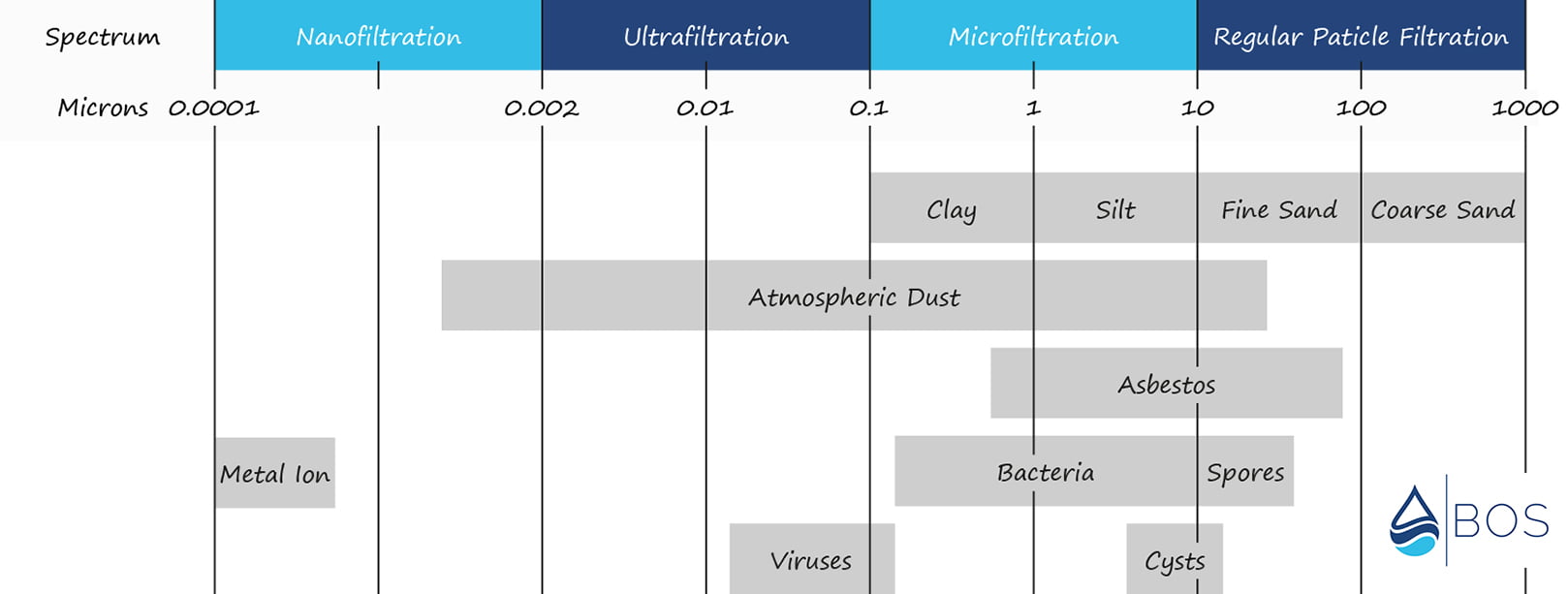What Size Micron Filter for Well Water? Find Out Here!
Written by: Alexandra Uta // Last Updated: Aug 15, 2023
This page may contain affiliate links. If you buy a product or service through such a link we earn a commission at no extra cost to you. Learn more.
If you’re buying a water filter for your home well water, you need to choose the right micron size.
Otherwise, you’ll have contaminants flowing freely through your filter and straight into your plumbing system.
How do you know what micron filter size is right for your well water?
Well, keep reading. We’re diving into micron size ratings for well water filters and how to choose the best one for your needs.
Key Takeaways
- A micron is 1/1,0000,000 of a meter.
- Many well water filters have a micron rating that defines how big or small their pores are. The lower the micron rating, the more capable a filter is of removing smaller particles.
- Common well water filter micron ratings:
- 100: Can block large particles like rust and sand.
- 50: Can remove dust, tinier sand particles, and other small but visible contaminants.
- 25: Can remove most granular contaminants from well water.
- 5: Good at filtering smaller particles like silt and sediments.
- 1: Best for filtering the finest water particles including bacterial cells.
- Sub-micron level: Suitable for filtering asbestos and even certain viruses.
- Tip: Have your water tested to know what contaminants you are dealing with. Choose a micron well water filter accordingly.
What’s a Micron?
A micron is used to measure the size of things – rather small things such as water contaminants and the pore size of water filters.
How Small Is a Micron?
A micron is very small, equaling 1/1,000,000 of a meter. Just think: a single hair strand has a diameter of about 70 microns – that’s how small a micron is.
Because it is that minute, a micron is a perfect unit for measuring the size of debris, dust particles, sand, and the pore sizes of the filters that block them.
Micron Ratings
Many water filters, mostly sediment-type filters, have a “micron rating” that defines how big or small their pores are. The micron rating helps buyers to understand what kind of contaminants a water filter can remove effectively. The lower the micron rating, the more capable it is of removing smaller particles.
Micron ratings can be described as nominal or absolute. Here’s what both mean:
Nominal Micron Ratings
The nominal micron rating of a well water filter indicates the approximate size of contaminants that it can remove. If the nominal rating of a well filter is 10 microns, it means it can remove about 80% (or less) of contaminants with a size of 10 microns. A nominal micron rating is fine if you need just an idea of a filter’s effectiveness.
Absolute Micron Ratings
Absolute micron ratings indicate that a well water filter cartridge can eliminate all the particles down to the specified size. Because it’s more precise, absolute micron rating are more reliable for knowing exactly how effective a well water filter is.
What Is a Micron-Rated Well Water Filter?
A micron-rated well water filter is one whose ability to remove contaminants of a specific size has been tested. Simply put, it is a well water filter that has been given a micron rating, whether nominal or absolute.
What Contaminants Does Your Micron Filter Remove?
This diagram explains the different contaminants that specific micron ratings can remove:
Common Well Water Filter Micron Ratings
Whole house well water filters come in different micron ratings. Here’s a breakdown of the usual micron ratings in the filter market and specific contaminants that each one can remove.
100 Microns
100-micron well water filters will block large water particles like rust fragments and sand.
50 Microns
This type is suitable for removing dust, tinier sand particles, and other small but visible contaminants.
25 Microns
This grade will remove most granular contaminants from well water.
5 Microns
These filters are good for filtering smaller particles like silt and sediments from well water supplies.
1 Micron
This is the perfect size for the finest water particles, including bacterial cells that are as small as 1 micron. A 1 micron filter is typically placed at the last point of a well water filter system to block any contaminants that may have escaped the other filtration stages.
The Sub-Micron Level
A sub-micron level filter has pores that are smaller than 1 micron; it is suitable for filtering asbestos and even certain viruses. However, 1-micron filters can tackle most household water contaminants, so a sub-micron filter is hardly necessary for well water filtration.
How Many Microns Should Your Whole House Filter for Well Water Be?
You may easily conclude that the lowest micron rating is best for your well water, but this isn’t always the case. When choosing a filter micron rating for your well water, there are a couple of things you need to consider to make the right choice.
What Do You Want to Remove? Have Your Water Tested!
You need to take a well water sample to a water laboratory for testing. The test will confirm what contaminants are present in your water and that will help narrow down your choice of micron ratings.
How Water Flow Rate and Pressure Are Influenced
A low-micron filter will reduce your water flow rate and pressure because your water has to go through tinier pores. If your water flow rate is low already, you may need to choose a higher micron rating to avoid water pressure issues.
The Type of Filter Cartridge
Another thing you’ll consider is the type of filter cartridge you’re buying for your well water. Here are the common types and what they do.
Sediment Filter Cartridges
Sediment filter cartridges are made up of materials that block solid water contaminants like sand and rust chips. They don’t work for chemicals for example. A sediment filter could be either surface or depth- type.
Surface Filter Cartridges (Pleated)
Surface filter cartridges trap contaminants on their surface. Some surface filters can be easily cleaned and reused when clogged.
Depth Filter Cartridges (String Wound, Melt Blown, Spun)
This type passes your water through the entire depth of its filter material. Contaminants are being trapped along the way. A depth well water filter can hold more particles than a surface filter.
Ultrafiltration Filter Cartridges
Ultrafiltration filters are designed to block tiny well water contaminants. They work well even for most microorganisms like bacteria.
On the flip side, using an ultrafiltration filter for your well water may greatly reduce your water flow rate.
Carbon Block Filters
This cartridge type is made of carbon, and it is effective for removing contaminants that are between 0.5 to 10 microns in size, depending on the filter model.
Note that carbon block whole house water filters are usually rated in nominal microns.
Do You Even Need a Whole House Well Water Filter?
If your well water contains contaminants like dirt, pieces of metal, and organic residues, you definitely need a whole house water filter to remove them and make your water safe for use.
Whole house well water filters also help improve the taste and smell of your well water.
How Often to Replace It?
If you use a sediment filter for your well water, you should replace the filter every two or three months depending on the severity of the contamination.
If you use a carbon filter, you can wait about three to six months before replacement.
If you have any thoughts about the question, what micron filter to choose for well water, please don’t hesitate to leave a comment below!
Information provided on BOS is for educational purposes only. The products and services we review may not be right for your individual circumstances.
We adhere to strict editorial guidelines. Rest assured, the opinions expressed have not been provided, reviewed, or otherwise endorsed by our partners – they are unbiased, independent, and the author’s alone. We fact-check all content for accuracy. It is accurate as of the date posted and to the best of our knowledge.



